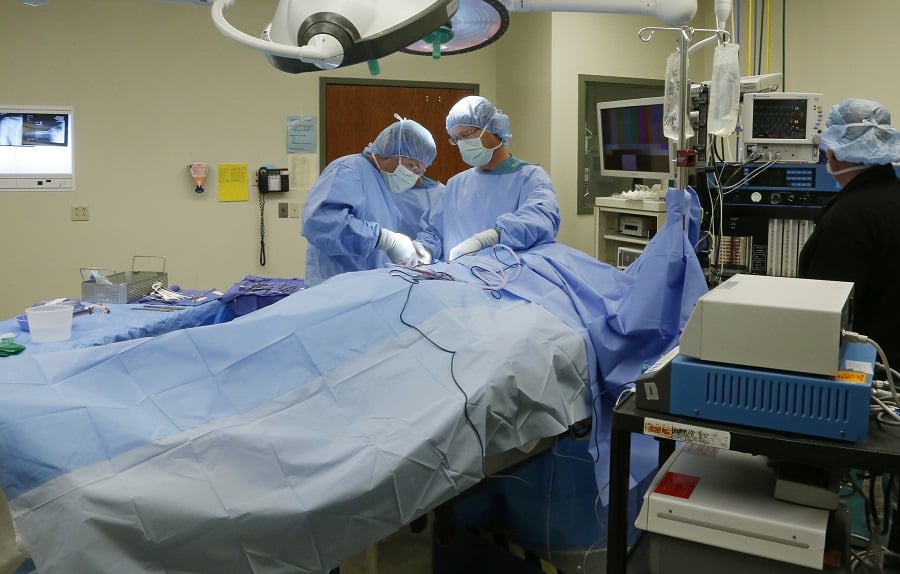 Researchers hopethe study will give private payors a better grasp of whathealth care costs are, and allow them to compare prices within astate and across states. (Photo: Shutterstock)
Researchers hopethe study will give private payors a better grasp of whathealth care costs are, and allow them to compare prices within astate and across states. (Photo: Shutterstock)
A new study by RAND and the Employers' Forum of Indiana(EFI) finds that hospital prices are much higher for employer-based health plans than forMedicare.
|The study gathered data from hospitals in 25 states, finding awide variation in what hospitals charged health plans. Theresearchers looked at claims data for more than 4 million people,with information coming from self-insured employers, statedatabases and records from participating health insuranceplans.
|Depending on the state, prices rose and fell in the periodbetween 2015 and 2017, the data showed, but on average, privateinsurers were charged 240 percent more than Medicare. Prices alsovaried widely among hospital systems, ranging from 150 percent ofMedicare prices at the low end to 400 percent of Medicare prices atthe high end. The cost of outpatient care from hospitals was higherthan the average inpatient costs, averaging 293 percent of whatMedicare would pay.
|Related: Reference-based pricing reimbursements: When tonegotiate
|“The widely varying prices among hospitals suggests thatemployers have opportunities to redesign their health plans tobetter align hospital prices with the value of care provided,” saidChapin White, the study's lead author and an adjunct senior policyresearcher at RAND, a nonprofit research organization. “Employerscan exert pressure on their health plans and hospitals to shiftfrom current pricing system to one that is based on a multiple ofMedicare or another similar benchmark.”
|The American Hospital Association has put out a statement taking issue with thereport, in part because of its sample size–utilizing data from1,598 hospitals in 25 states. In addition, wrote AHA in astatement, “Medicare payment rates, which reimburse below the costof care, should not be held as a standard benchmark for hospitalprices. Simply shifting to prices based on artificially lowMedicare payment rates would strip vital resources from alreadystrapped communities, seriously impeding access to care.”
|Different payors, different rules
EFI officials noted that private healthinsurance contracting for hospitals is done on a discounted-chargebasis, negotiated between insurance carriers and hospitals.Medicare, on the other hand, issues a fee schedule that determinesthe price it will pay for each service, with adjustments forinflation, hospital location, the severity of a patient's illness,and other factors.
|According to Gloria Sachdev, president and CEO of EFI, the newstudy will give private payors—such as employer-based plans—abetter grasp of what health care costs are, and allow them tocompare prices within a state and across states.
|“The purpose of this hospital price transparency study is toenable employers to be better shoppers of health care on behalf oftheir employees,” Sachdev said. “We all want to know whichhospitals provide the best value (best quality at best cost).Numerous studies have found that rising health care costs are dueto high prices, not because we are using more health careservices.”
|RAND recommendations
The research group issued a list of recommendations with thestudy. Some of the recommendations are in line with the recentmovement toward direct contracting, as employers seek to negotiatedirectly with high-quality, lower-cost facilities.
|The study's recommendations included:
- Employers can exert pressure on their health plans andhospitals to shift from discounted charge contracts to contractsbased on a multiple of Medicare or some other prospective caserates.
- Employers can use networks and benefit designs to move patientvolume away from high-priced, low-value hospitals and hospitalsystems.
- Employers can encourage expanded price transparency byparticipating in existing state-based all-payer claims databasesand promoting development of new ones.
Transparency by itself is likely insufficient to reduce hospitalprices; employers may need state or federal policy interventions torebalance negotiating leverage between hospitals and employerhealth plans.
|Read more:
Complete your profile to continue reading and get FREE access to BenefitsPRO, part of your ALM digital membership.
Your access to unlimited BenefitsPRO content isn’t changing.
Once you are an ALM digital member, you’ll receive:
- Critical BenefitsPRO information including cutting edge post-reform success strategies, access to educational webcasts and videos, resources from industry leaders, and informative Newsletters.
- Exclusive discounts on ALM, BenefitsPRO magazine and BenefitsPRO.com events
- Access to other award-winning ALM websites including ThinkAdvisor.com and Law.com
Already have an account? Sign In







